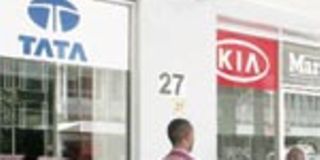MAIN STORY: Marshalls says goodbye to Peugeot

Marshalls East Africa East Africa has survived six decades mainly as the franchise-holder for Peugeot and witnessed a number of motor franchisees fall by the wayside. History, incidentally, has been on its side. Weeks back, prominently displayed in its Mombasa Road showroom was a gleaming vintage black leather-seat Peugeot car that claims the honour of having transported Princess Elizabeth and Prince Philip to Nyeri in 1952.

By the time the car — still looking new, with doors opening backwards — returned to Nairobi in that February of 1952, it was carrying Queen Elizabeth II. Her father, King George VI had died when she was in Nyeri.
No wonder even after losing the second major franchise in just five years — in 2002 they discontinued Honda cars though retaining the motorcycles — the listed motor vehicle dealer was putting on a brave face again. For the second time in half a decade, the company in a response sounding like drawn right out of the Kenya political-speak, said loss of the 60-year-old Peugeot franchise would have no consequences on its bottom line.
In part, going through confidential documents produced much earlier by its auditor Paul Moki, that could as well be the case. The papers suggested that Automobiles Peugeot, the Paris-based maker of the vehicles, was subsidising sale of some new units in Kenya, including a batch sold to Kenya Shell two years back.
Sources later told Smart Company Managing Director Ngovi Kitau had spent a great deal of time convincing Capital Markets Authority, KCB and the Nairobi Stock Exchange that parting with Peugeot was a financially sound decision. (We withhold identities of all sources for this story as the effective date of cessation of the franchise is next Monday — presumably why Peugeot is yet to announce a new franchisee — and sensitive details of a handover are yet to be fleshed out).
Apparently, on Friday December 14, the CEO had created the necessary consensus and subsequently issued a public statement on December 17.
Marshalls has not had a smooth ride with the franchise since it halted selling the fast-selling 504 models in 2004, after Peugeot discontinued CKD (completely knocked down) assembly. From the time Marshalls started selling 504s in 1968 until three years ago, the company had sold approximately 27,000 units. Paris discontinued their production and in the closing years Marshalls was importing them from Brazil and Nigeria.
Last year, sources claimed, the board of Marshalls, which is still profitable, declined to renew the franchise, which had reportedly bled cash for nearly three years, leading to a situation where Tata and KIA models were said by the company to have effectively overtaken Peugeot models. But in June, an agreement was signed and is set to expire on December 31.
The Automobile Peugeot statement, however, appears to contradict this version though, indicating they indeed initiated the action. “As a part of this planned (improvement) process, we are changing our local organisation,” they said in a statement last week as they announced the planned changeover after Marshalls did so. The announcement came as a similar changeover was poised to take place in Malaysia. Cycle & Carriage Bintang Bhd will be parting company with Automobiles Peugeot. The firm told Bursa Malaysia, the stock exchange, it would not be renewing its contract as Peugeot franchise-holder (now taken over by Naza Group of Companies) when it expires on the same date as Marshalls’.
The answer to why both the Kenyan franchise ended might lies in the categories of up-market cars Automobiles Peugeot churns out. Local industry figures show that saloons, where Peugeot is chiefly represented, have had a rather flat annual growth of about 4 per cent lately. In the new vehicles category, super-charged growth has been registered in the categories of trucks, one-tonners, four-by-fours, double cabins and pick-ups where construction, tourism and agriculture are calling the shots; over 13,000 new vehicle units could be sold (11,995 by November) in all categories this year.
New saloon car sales face tough competition from cheap second-hand imports, overall estimated to be in the ratio of three to one and accounting for a huge chunk of the Sh95 billion total annual sales. Before 1992, over 16,000 vehicular units used to be sold annually. New cars are especially a low-growth area compared to others, which come in CKDs, attracting zero duty and even zero VAT for buses.
Peugeot in the year to November managed only 108 units. Compare that with 2,568 for Toyota, which is well represented in the lucrative categories. Matters, according to annual reports, took a turn for the worse when the Government (whose institutions were, still are, the bedrock of Peugeot demand) halted buying new cars even as domestic private purchases for the French model faced the wrath of an appreciating euro.
“Peugeot sales have declined 12 per cent, which is consistent with industry trends in the passenger segment as a result of reduced government orders following the ministry of Finance directive,” said former chairman Michael Somen in the annual report for 2006/07.
Early this year, the poor showing resulted in paring of Peugeot operation employees from 365 to 120. On the other side, there are those who imply running of the franchise was wanting. “How Marshalls do their costing and accounting, how they manage their business, and whether they have been making or losing money on Peugeot sales is a very separate matter from the viability of the Peugeot franchise, which, worldwide, is regarded as one of the best in the business,” said people familiar with the matter, indicating Marshalls could have done better. They point out that Lonrho went under even with the lucrative Toyota franchise.
Revving up operations
Automobiles Peugeot said of media insinuation that they could be pulling out of market. “On the contrary, we aim to serve the Kenya market with even more vigour, by upgrading support facilities and performance, adding technical qualities specific to Kenyan conditions and extending our model range.”
The Kenyan firm already has equipment and inventory worth hundreds of millions. Marshalls, despite signing a Tata dealership sometime back, after Tata Africa became the franchisee, will find it an uphill task convincing the market, whose confidence is already tested in the wake of legal and at times verbal battles for control of the company between rival businessmen Kamlesh Pattni and Ketan Somaia. The Marshalls and the Peugeot brands are inseparable in the public psyche in Kenya.
To be sure, industry players agree the problem with Peugeot, whose franchise a local daily reported was likely to be snapped by some people formerly linked with Marshalls, is not the quality. Actually, the kind of advanced electronics and safety features are unmatched by most European cars.
Mr Somen’s remarks in 2002 reveal as much: “Automobiles Peugeot continue to produce some superb models which have been very popular here in Kenya and Europe.”
Marshalls, which has traded at the Nairobi Stock Exchange (NSE) since 1954 when the bourse was started, has had its ups and downs, making profit and loss in turns. Dividend has followed the same trend: last year they paid Sh1 per share. Hopefully, Tata, reportedly with 2,000 units on the Kenyan roads today may make the difference.
Last year, the firm became the latest battleground for Mr Pattni and Mr Somaia, two controversial tycoons, with matters coming to a head during an annual general meeting in September 2006.
It is not clear whether the franchise management or continuation has been impacted negatively by this tussle although any brand can do without the shenanigans. At the AGM, Mr Pattni, who lays claim to majority stake in the firm, claimed he was locked out and blamed this on Mr Somaia. The tycoon-turned-politician, who maintained the firm was under the steerage of a court-sanctioned receivership, later went to court to seek redress.
Since then things have moved fast. In April this year group Managing Director Isaac Mariera resigned. The board chairman Ngugi Kiuna said Mr Mariera would stay on until a successor was found. It would later emerge that man was Mr Ngovi Kitau who was previously with Bruce Trucks. No reason was proffered for the departure.
Last month, the board communicated to the NSE that Mr Somaia had been appointed to the board.
After that, the next big announcement would be made on December 14: the ending of the Peugeot franchise. Three days later, Marshalls sent a press release making to that effect. After the newspaper carried that report, Automobiles Peugeot, through their local agents, quickly put a statement of their own saying that they would remain in the country and would announce the new franchise-holder next month.
It remains unclear clear whether the problem with Peugeot, a brand now more popular in West Africa than East Africa, was Marshalls’ or the market. But an internal memo in 2005 painted a gloomy picture. “In some instances, the company is selling some units below the cost and/or at very small margin,” it said. “In our discussion with the group managing director, he informed us that Automobiles Peugeot is giving us support of euros 750 per unit sold to Kenya Shell.”
However, the same audit document notes that Automobiles Peugeot “commercial support schedule” indicated a much lower figure for that batch.




